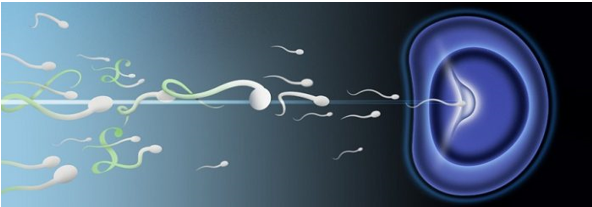5 Fertility Myths Debunked

Are you planning to have a child one day? Have you been trying to conceive for some time, but without success? Even with one in six couples having difficulty with fertility, there are still a LOT of fertility myths and stereotypes persisting today.
What comes to mind when you hear the term “fertility issues”? That it is a woman’s problem or maybe she has left it too late in life? Does it mean childless forever or is it something that only IVF can fix?
Fertility collects myths by the hundreds. But what about the realities of fertility? What are just myths and what is truth?
Here are 5 common fertility myths that I want to help to bust. Keep a note of these for yourself, your friends or for those offering well-intentioned but often inaccurate advice.
MYTH #1: FERTILITY ISSUES ONLY AFFECT PEOPLE OVER THE AGE OF 35 & ONCE OVER 39, THE CHANCES OF CONCEIVE ARE VIRTUALLY NIL
FACT: Yes, female (and male) fertility does slowly decline with age but age is only one of many factors in fertility issues. Be mindful of advancing age but don’t focus on it either or adhere to the stereotype. There are couples in their 20s and 30s who struggle with fertility issues as well as those in their late 30s and early 40s.
Recent data shows that over 80% of the 35-39 age group will conceive within a year of trying. The majority of people I see in my clinic are in the 35-43 age group and I find that the conception rate is about the same.
Don’t fret about your chronological age or let people wave your biological clock at you, just focus on improving your health to reduce your ‘biological age’. Healthy bodies are more likely to be fertile bodies
MYTH #2: FERTILITY/INFERTILITY ISSUES ARE ONLY A WOMAN’S PROBLEM.
FACT: Absolutely not. This has been an underlying myth for millennia.
Fertility issues are equal! There is a 40% chance that a fertility health issue resides with the woman, a 40% chance that it is due to male factor infertility, and a 20% chance that there is an issue with the combination of that particular couple. Sperm health is just as important as egg health. Both of these cells each provide 50% the DNA that will make up your future child.
When a couple is struggling with infertility, especially when it is unexplained, there has been a focus on testing and treating the woman with little or no focus on the male.
Even though the woman will be the one to carry the child, the man’s health not only affects the health of the sperm that will become his future child but also the health of the placenta and pregnancy outcome.

MYTH #3: MALE FERTILITY DOESN’T CHANGE AND MEN ARE FERTILE THROUGHOUT THEIR ENTIRE LIVES.
As mentioned above, fertility is often perceived as only woman’s problem. After all, it’s the woman who carries the baby and whose timing is essential when it comes to conception.
FACT: In many cases, a couple’s ability to conceive has more to do with male issues than the female partner.
The biological clock ticks for men too. While it is technically true that men well into their 70s have fathered children, most men experience a decrease in fertility from around the age of 35. Though men continue to produce sperm, the decrease in testosterone levels results in fewer sperm being produced and an increase in sperm abnormalities, potentially causing genetic problems and making it harder for the sperm to fertilize an egg.
Increasing paternal age is also associated with an increase in a number of health problems in their children.
MYTH #4: IF YOU HAVE ONE CHILD THERE WILL BE NO TROUBLE HAVING ANOTHER
Not necessarily.
FACT:
It doesn’t always mean you’ll have the same experience second time around…even with the same partner.
People who conceived naturally and easily the first time can struggle next time.
About one in seven couples encounters secondary infertility. In fact, the problem is actually more common than not being able to conceive in the first place.
“Secondary infertility” can come as a shock, particularly when conceiving your first child was straightforward.
Why would this happen? Perhaps you had an underlying problem when you conceived before that has got worse, you’ve had an illness or surgery, more stress or just increased time on the planet exposed to ‘fertility destroyers’.
On the other hand, couples who needed fertility treatments for their first child have been known to conceive naturally next time.
MYTH #5: IVF IS THE ONLY SOLUTION TO FERTILITY ISSUES

No. There is a feeling these days that, if you have fertility issues and IVF type treatment will solve the problem. It’s only one option, when all else fails.
FACT: Assisted Reproductive Treatments, including IUI’s, IVF, and ICSI etc. virtually only solve a ‘transport problem’. They do nothing toward the health of the egg, sperm or developing embryo.
These treatments are used on couples who have risk factors for fertility but rarely, if ever taking into account the underlying factors first – like general health, diet, nutritional status, weight, or lifestyle factors like smoking, stress etc.
Surely it makes sense to do all you can yourself to do some preconception preparation like eat well, improve general health and lifestyle factors. You’ll then significantly increase your chances of falling pregnant naturally or at least increase your odds of IVF success as well as supporting the health of any future pregnancy and child.
So, be very wary of buying into fertility myths and don’t become governed by them.
Anyone struggling to conceive, if it is you or someone you know, needs correct information, understanding and support in making decisions in their fertility journey.
I hope you’ve found the debunking of these 5 myths thought provoking. ‘Like’ our Facebook page to keep up with the latest news on natural fertility.
Want to know more? Still need help to get pregnant and take home a healthy baby?
Book your consultation or a complimentary discovery session HERE
